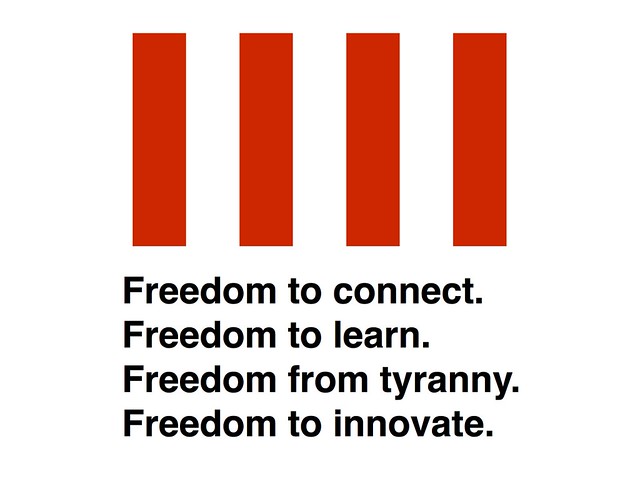Month: February 2013
In Hidalgo’s update, each new goal shifts from a focus on individual human rights to more social, communal aims. To speak and worship, to live free from fear or want—these are things that we do as individuals. To connect, learn, innovate, and fight tyranny—these are things that we do together. These freedoms don’t replace FDR’s original four, but build upon them, offering a thoughtful set of next steps for anyone thinking about how new social technology can be used to create more equitable communities.
Technology can be hugely helpful in strengthening communities. It can also be a huge distraction. The key is to make sure that new tools serve people first. That’s a self-reinforcing process. The more people there are paying attention and making their voices heard in the discussion about how technology can strengthen offline networks, economies, and places, the more likely it will be that new tools will be designed to make the dialog even more inclusive. In order to change the way that cities are run, the #CivicTech movement should lean more toward civics, and less toward tech.
Every citizen has a seat at the table, and technology’s job right now is to help people understand how they can have an impact on their communities. In Latorre’s words: “The cities that are more open, that are early adopters, are the ones where the citizens are more in charge than the technocrats. The next time you find yourself in a conversation about technology, stop—and start talking about outcomes and goals. Get out of the tiny little box of technology.”
Live life with porpoise.
I think it’s very healthy to spend time alone. You need to know how to be alone and not be defined by another person.
Bushwick’s Community Board 4 has been withholding liquor license applications and decisions from the public illegally, state officials said.
Governor Andrew M. Cuomo today announced that the Spending and Government Efficiency (SAGE) Commission has released its final report on modernizing and rightsizing New York State government. The final report identified initiatives that represent the most comprehensive reorganization of State government since those undertaken by Governor Al Smith in the 1920s. Collectively, they are expected to save over $1.6 billion once fully implemented, improve service to citizens and businesses, and increase transparency and accountability.
four freedoms of the 21st Century…
First, The freedom to connect.
For a properly functioning 21st Century New York economy, all must have accessible and affordable high speed internet. Wireless or wired, all New Yorkers need unfettered access to connect.
Second, The freedom to learn.
For a properly functioning 21st Century New York economy, all New Yorkers need access to top quality education. Regardless of language, age, or class, all New Yorkers strive for the freedom to learn.
Third, The freedom from tyranny.
We must be able to know WHAT our government is doing. We must have the ability to interface with our government, wherever, whenever, and regardless of platform. We must have the power to affect change and truly be a government by the people for the people.
Fourth, The freedom to innovate.
This city was founded on innovation. From the fur trader to the 21st Century Maker, this City’s heritage is rich in entrepreneurial ideas. Our innovations don’t know nationality, race, gender, sexuality, age, nor language. We need laws and policies that keep us grounded in opportunity, provide for the general defense of the commons, and enable us to keep growing.
—
For the past few months, I’ve been thinking of the best way do describe our 21st Century values to elected officials and people running for office. I know there is the Declaration of Internet Freedom, but I don’t think it properly encapsulates our collective values for a fully functional economy and society. Working off of FDR’s Four Freedoms, I’m proposing these four freedoms for our 21st Century.
If you have an idea, comment, or point, use #4Freedoms hashtag.
Code Across America!
Connect with citizens throughout the country who are passionate about technology and their communities. Together with our friends, colleagues and neighbors, we’ll Code Across America in service to the places where we live. Code Across America is a multi-day event that any municipality or community can join, big or small, beginner or expert. Individuals and groups can Code Across America through virtual and in-person activities around the country. February 23rd is International Open Data Day.



